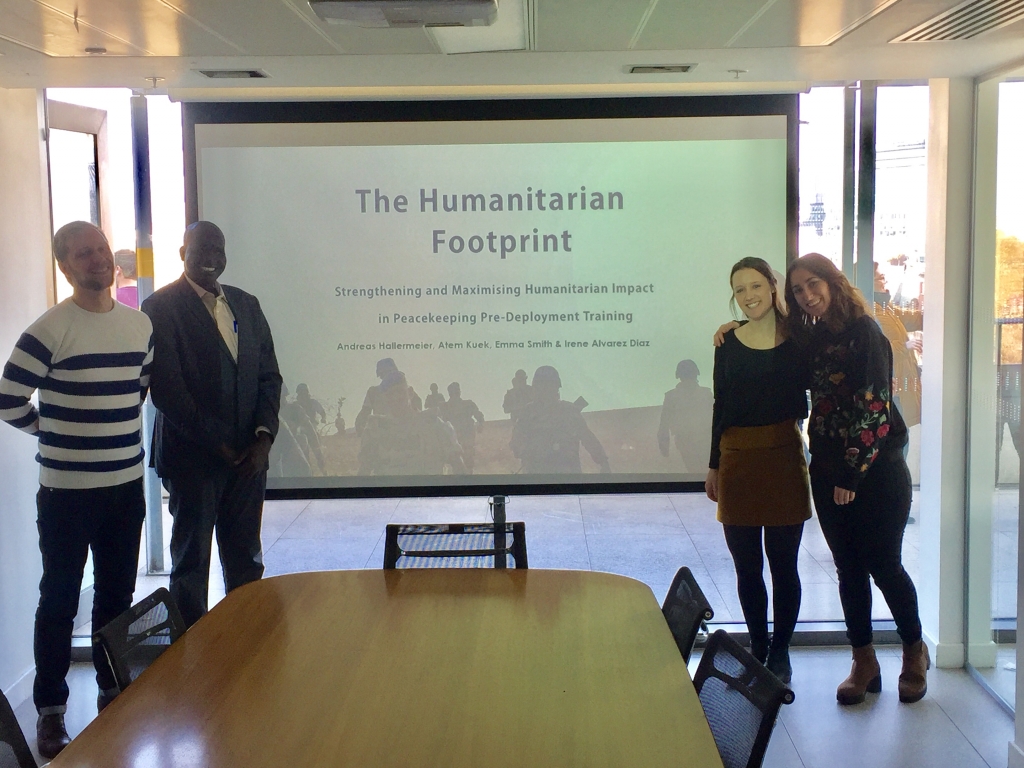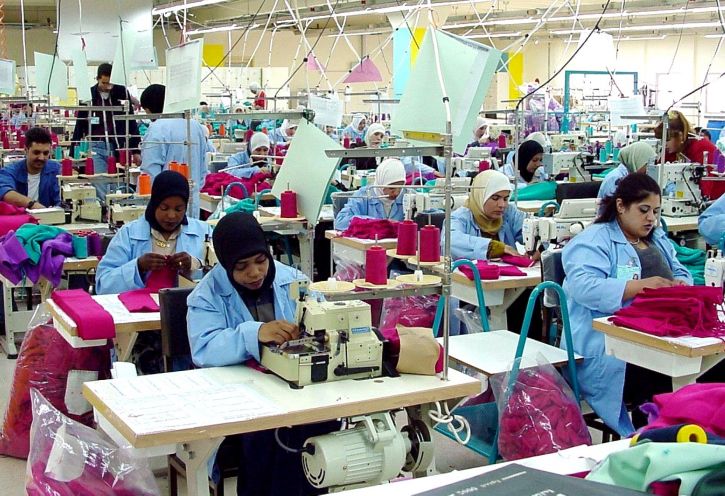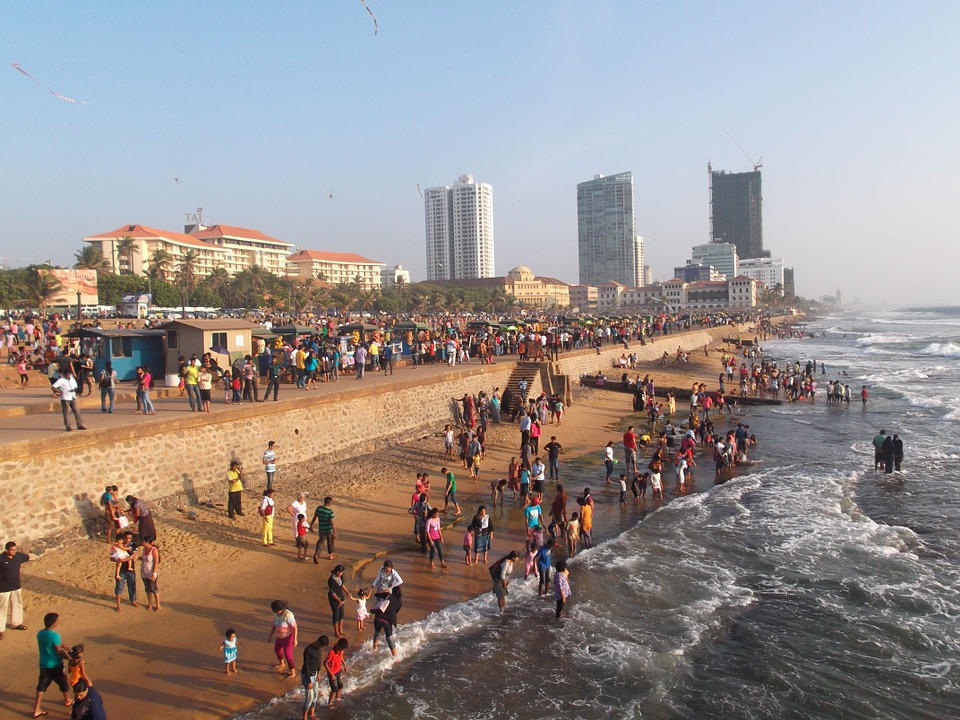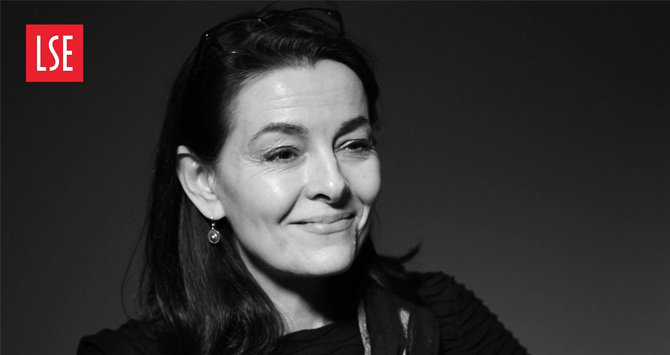MSc International Development and Humanitarian Emergencies students, Emma Smith, Atem Kuek, and Irene Álvarez-Díaz, tell us about their consultancy project with the United Nations Office for Coordination of Humanitarian Affairs (OCHA), for which they researched ways of strengthening and maximising humanitarian impact in peacekeeping pre-deployment training for blue helmets, UN police, and regional organisations.

As a part of the LSE Masters in International Development and Humanitarian Emergencies (IDHE), we have the opportunity to participate in a humanitarian consultancy project. The project is meant to provide a practical experience of dealing with current policy issues and best practices in the fields of humanitarian assistance by working directly with a client.
For the last six months, four of us – Irene Alvarez-Diaz, Atem Kuek,Andreas Hallermeier and Emma Smith – have been working on a consultancy project with the United Nations Office for Coordination of Humanitarian Affairs (OCHA). The project was focused on strengthening and maximising humanitarian impact in peacekeeping pre-deployment training for blue helmets, UN police, and regional organisations. Our objective was to discover what exists in terms of peacekeeping training centres and programs for blue helmet and UNPOL pre-deployment training courses, as well as understanding the humanitarian footprint of these trainings. The research conducted will provide a basis for OCHA’s engagement strategy. Looking back, we can identify two main methodological stages of our consultancy project: desk review and interviews.
In the desk review stage – in order to understand the landscape of peacekeeping pre-deployment training – we built a database of over 200 training centres around the world. As we would not have time to interview all of these centres, we looked at the Department of Peacekeeping Operations (DPKO) list of top troop contributing and police contributing countries (TCCs and PCCs, respectively) to decide where we should prioritise interviewing. We decided we would focus on the top twelve TCC and PCCs in our interviews, as these twelve countries contributed 2,000+ troops – nearly twice as many as than those further down on the list. Interestingly, we noticed from our desk review that Africa and Asia were the regions with the fewest number of courses and training centres. Yet all of the countries on the list of top TCCs and PCCs were in these two regions. Findings such as these eventually led to our recommendations for OCHA.
Our second research phase was conducting interviews. Our client at OCHA worked with DPKO in New York to facilitate discussions with leaders at the helm of peacekeeping pre-deployment training centres from the top twelve TCCs and PCCs in Africa and Asia. For nearly three months, all of us would gather together in the basement of the LSE library with Emma’s phone on speakerphone, talking with our client in the Palais des Nations on one end of the line and leaders of peace operations around the world on the other. This unique experience gave us a first-hand experience and insights into humanitarian messaging in peacekeeping – allowing a space for learning that may not have been possible outside of this distinct opportunity.
A particular highlight of our project occurred in early February, when members of our team flew to Geneva to exhibit our work at the Humanitarian Networks and Partnerships Week (HNPW), the largest conference put on by the OCHA. The HNPW brings together best-in-class experts and organisations to discuss solutions to common challenges in humanitarian response. This year, the HNPW convened experts from the Red Cross and Red Crescent movement, the United Nations, private sector, academia, NGOs, government representatives, and more. We set up an exhibition stand explaining our research process and highlighting our preliminary findings. Through engaging with the diverse individuals present at the conference, we received valuable and interesting feedback on our consultancy project. Importantly, we also gained perspective about the broader context of peacekeeping that our project fits into.
While at HNPW, we were also able to attend sessions on key topics of interest to the humanitarian community. From private/public sector partnerships to environmental data collection, we had the opportunity to learn in a direct way about current challenges and questions humanitarian actors were facing. This is an example of how the LSE consultancy project provides space for more practical and hands-on learning – an important complement to the more conceptual coursework that constitutes the MSc program in International Development and Humanitarian Emergencies. At HNPW, just as in our consultancy project, we were able to get a sense for what things are like on the ground and how things work in real-world humanitarian response situations.
The consultancy project has enriched our experience at LSE through teamwork and the in-depth exposure to a new topic. Our team hailed from the US, Germany, South Sudan, and Spain. And our paths before LSE were as diverse as our nationalities: ranging from serving many years as soldiers in the South Sudanese and German militaries to having freshly graduated from college. The consultancy project gave us an opportunity to come together and learn from each other’s diverse perspectives, approaches, and experiences. Moreover, it helped us form valuable friendships. While working together, we also got to learn in-depth about the challenges facing OCHA and DPKO in terms of maximising and strengthening humanitarian messaging in peacekeeping pre-deployment training.
In this, we are especially grateful for our client, Marie Sophie-Reck at OCHA, for the ways she inspired and facilitated our learning throughout the project. It was a true delight to learn from and work with someone so deeply committed to humanitarian aims. We hope that OCHA and DPKO will utilize our recommendations to strengthen and maximise humanitarian messaging in the training of blue-helmets, police, civilians and other regional organisations.
The LSE International Development and Humanitarian Emergencies consultancy project is an unparalleled, rigorous, and rewarding experience. We hope that future and prospective students will benefit as much as we did from the first-hand learning, collaborative environment, and real-life research opportunity that the consultancy project offers. In our opinion, this project sets LSE apart as an exceptional place to study International Development.
Emma Smith (@emmyagsmith), Atem Kuek, and Irene Álvarez-Díaz (@IreneADiaz), are all MSc Candidates in International Development and Humanitarian Emergencies.
The views expressed in this post are those of the author and in no way reflect those of the International Development LSE blog or the London School of Economics and Political Science.





